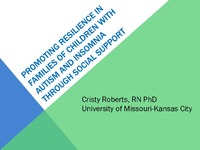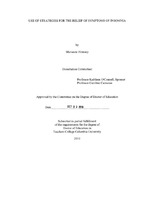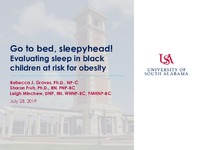| dc.description.abstract | <p>Session present on Sunday, July 26, 2015:</p>
<p><strong>Purpose:</strong> Children with autism spectrum disorder (ASD) often have co-occurring health conditions including sleep disorders. Sleep problems in children can have a profound effect on the entire family. While most of the current research on ASD has focused on the children's issues, it is equally critical to understand the families' issues of adapting and dealing with stress induced by the sleep problems. Very little is currently known on how resilience is achieved and maintained among families. The Resiliency Model of Family Stress, Adjustment, and Adaptation provides the conceptual model for this study. Resilience is defined as "the ability to withstand and rebound from life challenges". The model provides a framework to evaluate how families respond to the specific stresses of parenting. Sleep issues affect up to 86% of children with ASD as confirmed by parental reports and polysomnography studies. A high prevalence of insomnia, including both sleep delay and sleep latency (duration) are common. Strong correlations have been shown between challenging behaviors of ASD and sleep problems. Sleep impairment is related to greater repetitive behaviors, hyperactivity, and mood disorders. Strict adherence to routine which can be a characteristic of autism often leads to difficulty with settling into sleep at night. Sleep problems in children with ASD do not seem to disappear over time without interventions. Sleep strategies such as sleep hygiene and behavioral therapies are helpful. Children's sleep problems are highly related to parental sleep disturbances. Poorer parental sleep was found to be related to higher fatigue levels, higher anxiety and depression, and lower levels of activity in parents. Parental reports demonstrated that the impact of sleep problems on family life between parents of children with ASD or (typically developing) TD children differed; the effect of sleep disturbances was much greater when the child had ASD. Sleep deprivation has many deliterious effects including decreased energy conservation, cognitive functioning, and ability to regulate emotions, especially mood. Research Questions. Quantitative: How does family resilience differ between families of children with ASD who have and do not have sleep problems? Which independent variables among sleep problems, family resilience sub-indices, and family demographic data show the best prediction for positive adaptation? Qualitative: How are adaptation and resilience processes ameliorated by improvement of child's sleep? Mixed: How do narrative findings of parents of children with co-occurring ASD and sleep problems support, expand, or conflict with the results of the regression analysis findings?</p>
<p><strong>Methods:</strong> An explanatory sequential mixed methods design involved collecting quantitative data first and then explained those results with in-depth qualitative data. Survey data was used to analyze the variables of sleep problems and demographic data with family resilience. Subsequent to the collection of survey data, family resilience was explored using interviews with families. Families whose children had sleep problems were invited to participate in interviews. Mixed design data was connected to analyze, compare, and contrast findings in order to establish relationships. After institutional board review was approved at two MidwesteRNediatric hospitals and clinics, participating families were solicited via mailed letters. The letters contained information about the study including purpose, incentives, and confidentiality. Three questionnaires were used: a demographic survey, the Family Index of Regenerativity and Adaptation-General (FIRA-G), and the Children's Sleep Habits Questionnaire (CSHQ). Parents completed information regarding child's gender, age, race/ethnicity, age of diagnosis, specific autism diagnosis, co-occurring diagnoses, food allergies, gastrointestinal problems, age of sleep problem onset, medications, therapies, and a listing of those living in the home with ages, and who serves as the primary caregiver. The FIRA-G includes seven sub-indices. Family stressors include items regarding significant family changes in the previous year. Family strains include items regarding family problems conflicts, financial difficulties. Relative and friend support include items seeking support and advice from friends and relatives. Social support includes items regarding interactions among family members and community help. Family coping-coherence includes items regarding spirituality and acceptance. Family hardiness includes items regarding problem-solving, family activities, locus of control. Family distress includes items regarding serious psychological problems such as substance abuse, divorce, violence. The subscales of the CSHQ are: bedtime issues, sleep behaviors including amount of sleep (including parasomnias), night awakenings, moRNg waking, and daytime sleepiness. During interviews, family members were asked to describe the child's behaviors, family functioning, and any current sleep strategies. Sequentially, retrospective evidence derived from parental responses to qualitative interviews described how families achieved positive or negative adaptation which led to richer insight into family processes. Convergence of results from these mixed methods substantiates which family adaptive behaviors and interventions best served these families.</p>
<p><strong>Results:</strong> Seventy-five families retuRN the questionnaires and of that number 70 were complete and used for the quantitative analysis. Six subsequent interviews were conducted with eight parents. The qualitative data (interview transcripts) were analyzed with thematic content analysis as well as analysis of the verbal responses related to specific items on the CSHQ. The survey data was analyzed through descriptive, correlation, analysis of variance, and regression statistics. Families of children who had sleep problems as measured by the CSHQ did show higher levels of negative resilience sub-indices as measured by the FIRA-G than families of children who did not have sleep problems. The child's age was not significantly related to any sleep or resilience scores; time since the ASD diagnosis was not significantly related to resilience scores. Families with financial problems had significantly lower coping-coherence scores when compared to families who did not have financial problems. Relative and friend support was significantly correlated with social support. Social support was significantly correlated with hardiness. Families of children who had sleep problems had lower overall resilience, specifically on measures of strains and distress. Predictors of hardiness, the dependent variable; were coping-coherence, social support, and strains. Social support contributed the most to the regression model with the largest beta estimate. Families were asked about community involvement and family sacrifices through the social support FIRG-A sub-inventories. Coping-coherence items include concepts related to acceptance, positive reframing, and faith. Potential strains that could decrease resilience were measured by items such as conflicts at home, difficulties at work, and finances. Themes from interviews substantiated these predictors. Several parents stated that they 'wouldn't change a thing, we love our child as he/she is' or 'you accept what you are dealt' or 'focus on the positives', although all parents would appreciate improved sleep for their child and themselves. Parents told stories of the impact that poor sleep had on their families. They also revealed issues with obtaining necessary services for their child and adaptations their families needed to make. Most of the participants talked about how family dynamics, including the ability to rebound, improved over time.</p>
<p><strong>Conclusion:</strong> The goal of discovering patteRNof functioning in families that lead to resilience when their child has ASD and sleep problems was realized. Higher hardiness scores indicate that families felt an increased inner-familial strength and consequently a higher sense of control in their lives. Hardiness refers to an active orientation to stressors and is revealed when families call upon their inteRN vitality. Social support services for families need to provide assessments of family functioning, access to community services, and counseling including sleep hygiene strategies. Ultimately, assisting families resolve sleep issues will help children with ASD integrate better into their community and social settings by ameliorating behaviors that may be exacerbated by sleep disruptions. An important benefit would be realized by parents and family members who deal with interrupted sleep. Variables intrinsic to McCubbin & McCubbin's Family Resiliency model such as family's appraisals and capabilities, resources, and social supports will guide future research and intervention studies.</p> | en |





